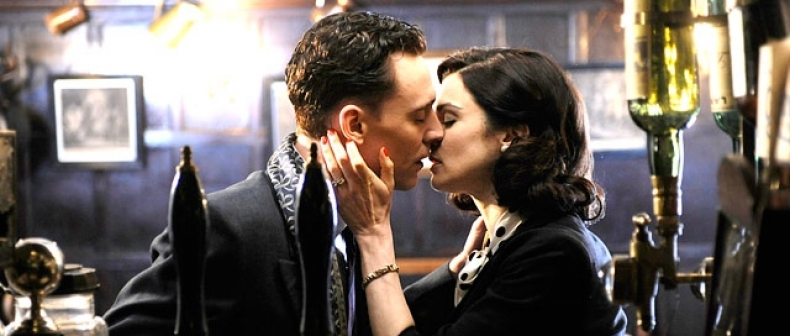
Scene from The Deep Blue Sea.
Though it has its origins on the stage, The Deep Blue Sea is the most exquisitely cinematic work to hit screens so far this year. Nothing else even comes close. Director Terence Davies (The Long Day Closes, The House of Mirth) throws out huge chunks of Terence Rattigan’s text in favour of enigmatic glances, gliding tracking shots, and swoony chiaroscuro effects. Even better, he completely reframes the central scenario, subtly transforming a rather phoney 60-year-old play into something truthful and profound.
The film begins in darkness, with the strained voice of a woman reading her own suicide note. Then a title card appears with the time and place: London, “sometime in the 1950s.” (If you’re a fan of Davies, the setting barely needs to be stated — post-war England is to Davies what late-19th-century France was to Proust.) It’s morning, and the first thing we see is a boarded-up lot housing the remains of a bombed-out building. Then the camera pans away to show people carrying on as usual, almost as if the war hadn’t happened: a man lighting the day’s first cigarette; another man gathering milk bottles from a tenement stoop; an old woman sitting at a window turning over the radio. Finally, the camera tracks upward to take in a woman in the window above, Hester Collyer (Rachel Weisz). Unlike everyone else, Hester isn’t carrying on — she’s still in her robe, blankly surveying the action below.
As it turns out, Hester’s suicide attempt was the night before, and Davies takes us back in time via a series of short, impressionistic scenes to see what brought her to it. We discover she is the wife of a highly proper judge, Sir William Collyer (Simon Russell Beale), but that she fell hopelessly in love with a young working-class fighter pilot named Freddie (Tom Hiddleston). Unfortunately, Sir Williams’ love for her is genuine, whereas Freddie’s love is hollow and doomed to fade. Though Hester understands this from the very beginning, she abandons her comfortable life with Sir William anyway, moving into Freddie’s small, dank flat. Later, when Freddie has all but abandoned her, Sir William confronts her and asks why she stays with him. “Love, Bill'” she says. “That’s all.”
In the original play, Hester’s love for Freddie is posited as the truest kind of love, a passion so pure and all-consuming it need not even be returned. (As a gay man, Rattigan presumably had a bit of experience with unrequited love.) But in order to get the point across, Rattigan unintentionally made her both insufferably superior and subtly patronizing. None of the other characters — Freddie, Sir William, the many concerned neighbours who encourage her to go on living — have the foggiest notion why she did what she did, for the simple reason that they’re too hopelessly conventional and spiritually cloddish. Over and over again, they express obtuse puzzlement at the depth of her feelings, and Hester invariably responds with weary, half-hearted elliptical comments designed both to placate and confound. “Whatever possessed you to do such a dreadful thing?” asks the landlady, to which Hester replies, “Oh, the devil I suppose.” There’s a variation of that exchange on almost every page of the original script, and it gets a wee bit tiring. In Rattigan’s eyes, unrequited love makes one superior, and it justifies condescension.
The remarkable thing about the film version is how thoroughly Davies reverses Rattigan’s snootiness, mostly via extensive rewrites. Not only does he eliminate the bulk of Hester’s on-high retorts, he allows everyone else their own share of wisdom and depth. When Sir William visits Hester for the last time, he sheepishly gives her a collection of Shakespeare’s sonnets as a birthday present, and he’s perceptive enough to recognize how feeble a gesture it is. Hester, however, responds cluelessly — something along the lines of, “Gee, thanks, I’ve always loved the sonnets!” — and it isn’t until she looks him in the eyes that she understands how much more the offering means to him than it does her.
While Rattigan was an upperclassman, Davies’ origins are working class, and the collision of sensibilities brings the play’s high-flown tragic dimensions agreeably down to earth. When Hester explains to Sir William that she stays with Freddie for love, Davies provides a follow-up exchange in which she adds, “It’s sad, but it’s not Sophocles.” And towards the end, when Hester is at the height of her rather solipsistic grief, the landlady — who has been nursing her dementing, bedridden husband in the flat below — provides some kindly but firm perspective: “You know what real love is? It’s wipin’ somebody’s arse or changin’ the sheets when they wet the bed.” Then she adds, pointedly, “Suicide — it’s not worth it.” This is pretty much a complete inversion of Rattigan’s lofty fatalism, but, paradoxically, it raises the play to a higher plain.
I wish I’d left more room to discuss the performances, but suffice it to say Beale and Hiddleston are both excellent and perfectly cast. Initially, Beale’s Collyer comes off as the typical pompous boor, but he gradually reveals almost heroic levels of sensitivity and wounded befuddlement. And Hiddleston gives Freddie just the right mix of boyish charm and callowness — you don’t like him, really, but you sympathize with him. As for the always intelligent Weisz, she makes Hester not just tolerable, but highly affecting. Instead of luxuriating in self-pity, she radiates confusion and an almost paralyzing fear of loneliness. When Freddie threatens to leave for good, another actress might have ratcheted up the emotion, but Weisz dials it down, making it clear just how much effort it takes for Hester to keep from falling apart.
At the finale, we leave Hester in the same place we found her, staring out the window over the street below. And though we thought we knew what she was feeling then, now we’re not so sure. She could almost be Garbo at the end of Queen Christina — gazing upon the horizon, yet keeping whatever she sees there entirely to herself.
Scene from The Cabin in the Woods.
The advance word on the new horror movie The Cabin in the Woods is that it contains a big twist you can’t let anyone spoil, but the filmmakers spoil it themselves in the first shot. Instead of introducing the teen protagonists seen in the trailers — the ones scheduled for slaughter at the title location — we’re introduced to two middle-aged clock-punchers working in an underground bunker. Via headsets, the two men communicate with a covert operative topside who’s spying on the teens. Only then do we meet the teens themselves: the usual slasher-pic assortment of jock, stoner, sensitive guy, bitch, and virgin. With their identities established, the teens pile into a van and head out for their doomed cottage weekend. “The birds have flown the nest,” reports the covert-ops guy.
Assuming you’re not a total simpleton and can put two and two together, there is no twist coming. The teens are (OMG spoiler alert!) in a horror-movie version of The Truman Show, and the men in the bunker are contriving everything that happens to them. This is the movie’s sole novelty, and it allows filmmakers Drew Goddard and Joss Whedon to trot out all the old cliches under the guise of “subverting” them. But this isn’t subversion. Subversion means upsetting the conventions, not geekily reasserting them via a measly meta twist. If Goddard and Whedon had established the game and then taken it in some legitimately unexpected directions, they might have had something halfway worth watching. But their only brainstorm was the gimmick itself, and everything that follows is just so much filling in the blanks. The Cabin in the Woods isn’t just fanboy pandering — it’s entertainment in quotation marks.
_____
Scott MacDonald writes about cinema for Toronto Standard.
For more, follow us on Twitter: @TorontoStandard and subscribe to our Newsletter.














